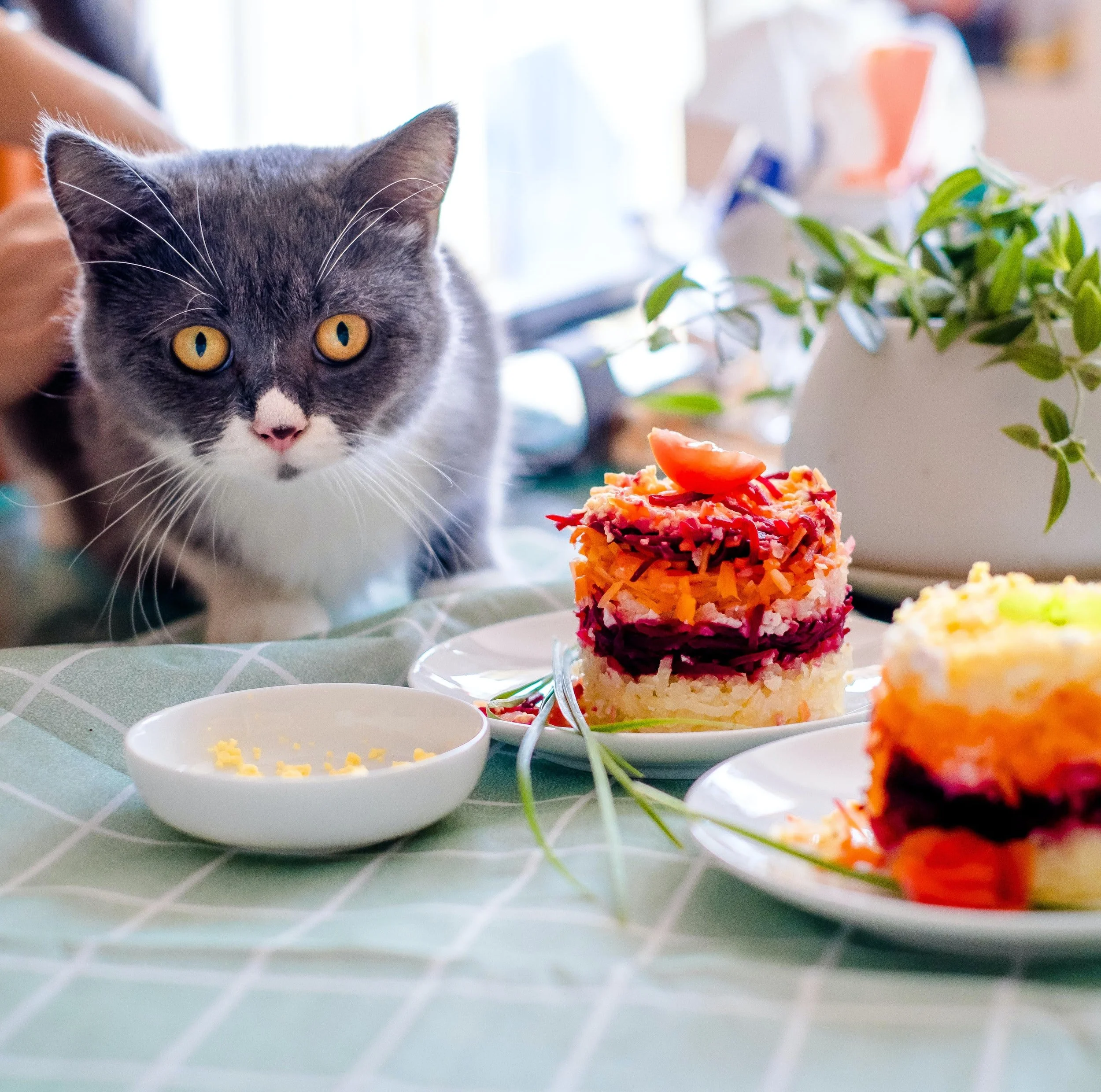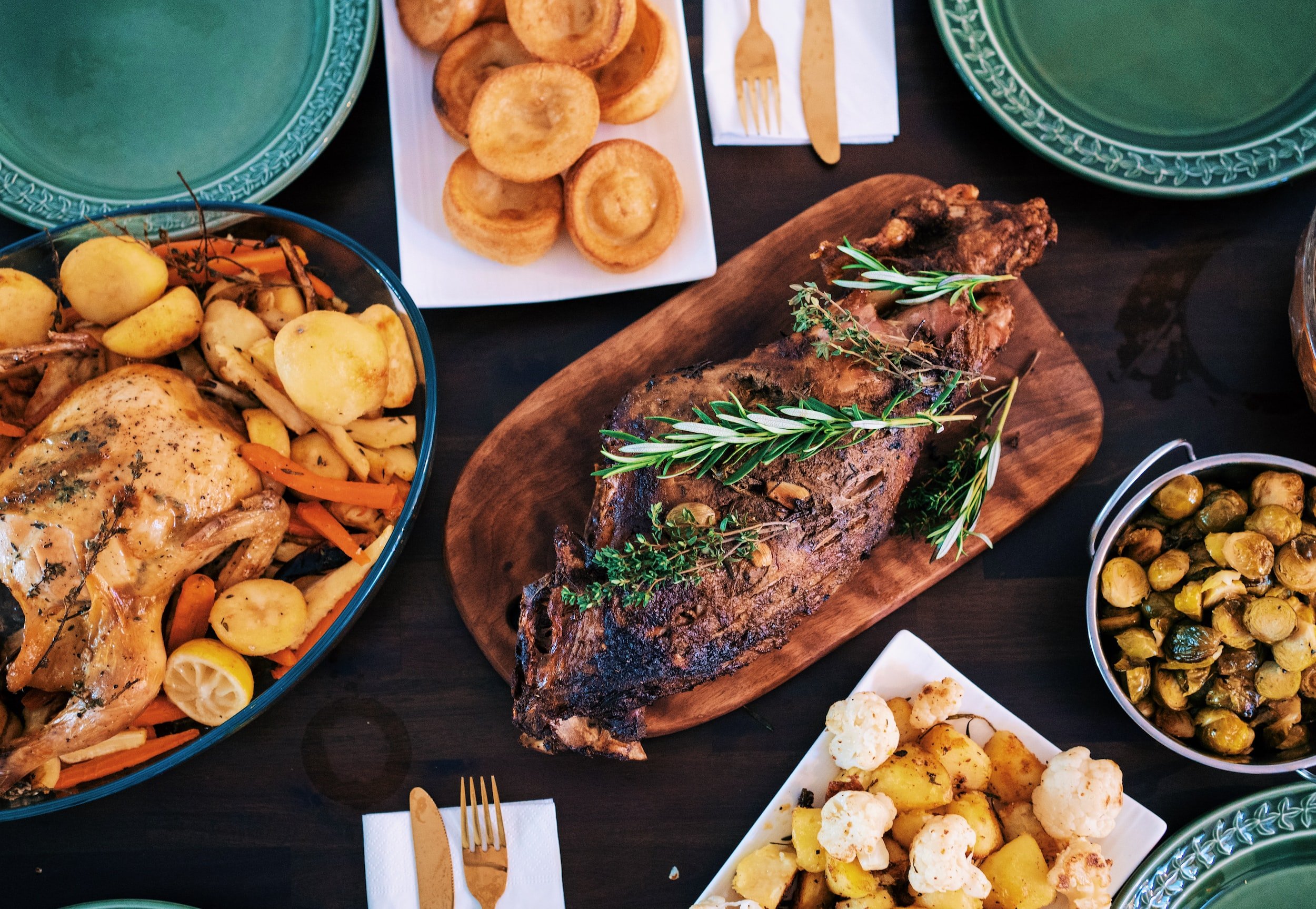There are many celebrations with family and friends involving food over the festive season. Your four-legged friend might see this as an opportunity to join in by begging for a piece of the action. Whilst it may be hard to resist those pleading eyes, offering table scraps to your pet is generally not a good idea.
Can pets eat table scraps?
Whilst it may be tempting to feed your pet table scraps, it is generally not a good idea. Some human food can be toxic or dangerous for pets to eat. A sneaky treat or special meal for your pet at Christmas can quickly turn into a tummy upset, excessive wind or a trip to the vet. Offering your pet table scraps can also encourage them to beg for food every time you sit down for a meal, resulting in undesirable behaviour.
The dangers of offering your pet table scraps
Tummy upsets
Humans and pets consume and digest foods differently. Some foods that are safe and nutritious for humans to eat can be problematic for pets. Many table scraps can have a high salt, fat or sugar content which can lead to stomach aches, vomiting, diarrhoea, and excessive wind. For more on tummy upsets and when to see the vet click here.
Pancreatitis
A diet high in fat is one of many risk factors that have been associated with the development of pancreatitis. Pets with pancreatitis can become extremely ill and can display the following signs:
Vomiting
Diarrhoea
Abdominal pain
Loss of appetite
Dehydration
Lethargy
Fever
If your pet is showing signs of pancreatitis get in touch with us immediately on 03 8784 4444.
Toxic foods
Many human foods contain ingredients that are toxic to your pet. Garlic, onion, chives and leeks are poisonous to both dogs and cats if too much is eaten. Chocolate, grapes, raisons, currants, sultanas and macadamia nuts that are often hidden in desserts and indulgent treats are not safe for pets. Many lollies and sugar free treats containing xylitol are toxic to pets also.
If you suspect your pet has swallowed something toxic or is displaying signs of poisoning, contact us immediately on 03 8784 4444.
Choking hazards
Some foods are dangerous to dogs and cats as they are a choking hazard. All bones, especially turkey or chicken bones, whether they are raw or cooked, are a choking hazard. Whole or splintered pieces of bone can get caught anywhere from the mouth, inside the throat to the stomach. They can even cause blockages in the intestines, which may require surgery to remove.
Other common foods that can become a choking hazard include large fruit pips, corn cobs, pieces of hard, raw vegetables and nuts.
Weight gain
Whilst you might think the occasional treat won’t cause any harm, you might be surprised by how quickly they add up. Too many treats can lead to weight gain.
An overweight pet often faces a range of health problems and it can have a significant impact of their quality of life. Dogs and cats should get most of their daily nutritional requirements from a complete and balanced diet consisting of quality pet food suited to your pet’s individual needs. If you do offer your pet a safe treat, it should make up less than 10% of your pet’s calorie intake for the day.
Encourages begging
Offering your pet table scraps can encourage them to beg for food every time you sit down for a meal. Not only is this undesirable behaviour, but it can result in your pet being fed by guests when they too find it difficult to resist those desperate eyes.
Table scraps that are toxic to your pet
Some foods are dangerous to dogs and cats as they are either poisonous or a choking hazard. These foods should never be fed to your pet:
Turkey or chicken bones – whether they are raw or cooked, bones are a choking hazard.
Garlic, onion, chives and leeks - are in the Allium family and are poisonous to both dogs and cats if too much is eaten. These common ingredients are often found on the festive dinner table and can be hidden in gravy and stuffing so avoid giving these to your pet for a treat.
Mince pies & Christmas pudding - Grapes, raisons, currants and sultanas are toxic to dogs. Many Christmas desserts such as mince pies and Christmas pudding are rich in these ingredients so keep them away from your furry friends.
Alcohol - Alcohol can cause severe liver, kidney and brain damage in animals. As little as a tablespoon can lead to problems for your pet so keep it out of reach.
Chocolate – in all forms, especially dark or cooking chocolate. Symptoms of chocolate poisoning include vomiting, diarrhoea, rapid breathing, increased heart rate, tremors and seizures.
Sweets – many lollies and sugar free treats that contain xylitol are toxic to pets. Such poisoning can lead to lethargy, loss of balance, permanent brain damage, liver failure and death
Macadamia nuts - Macadamia nuts are often found at Christmas time in cookies, cakes and other indulgent treats. However, they are not safe for dogs. Even a small amount of these nuts can cause severe symptoms including vomiting, ataxia, weakness, fever and muscle tremors. So if you are thinking of giving you pooch just a little taste, don’t!
If you suspect your pet has swallowed something toxic or is displaying signs of poisoning, contact us immediately on 03 8784 4444.
Healthy ways to treat your pet
Before giving a food treat to your pet, consider giving them a gift instead. A new toy or quality time with you such as play time, cuddle time or a walk to burn off some of those extra calories that you have consumed throughout the day can be just as rewarding for your furry friend.
You can offer your pet a healthy, high quality pet treat and factor it into their overall calorie intake for the day.
Not all human foods are off limits to pets. If you do decide to give your pet a human food treat, keep in mind the following:
CHECK to ensure you don’t feed your pet anything toxic or fatty. Learn what foods are toxic or unsafe so you can keep these away from your dog. To find out what you can feed your pet at Christmas click here.
DON’T feed them a big Christmas meal or give them too much, the smallest amount can be a big treat in your pet’s eyes
INCLUDE the treats that you offer in their overall calorie intake for the day. This may involve reducing their usual meal to balance out their daily calorie allowance.
OFFER their treat after your meal to avoid them getting into bad habits and expecting a treat every time you have a roast dinner.
Often pets will eat and enjoy anything that is offered to them. However, this doesn’t necessarily mean it is good for them. It is important to understand what is healthy and safe for your pet to eat and offer them a complete and balanced diet. Whilst you may find it difficult to resist those begging eyes, remember it’s for their own good. After all a healthy pet is a happy pet.






